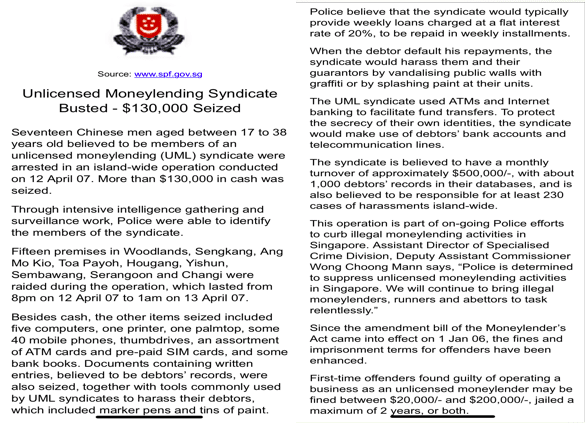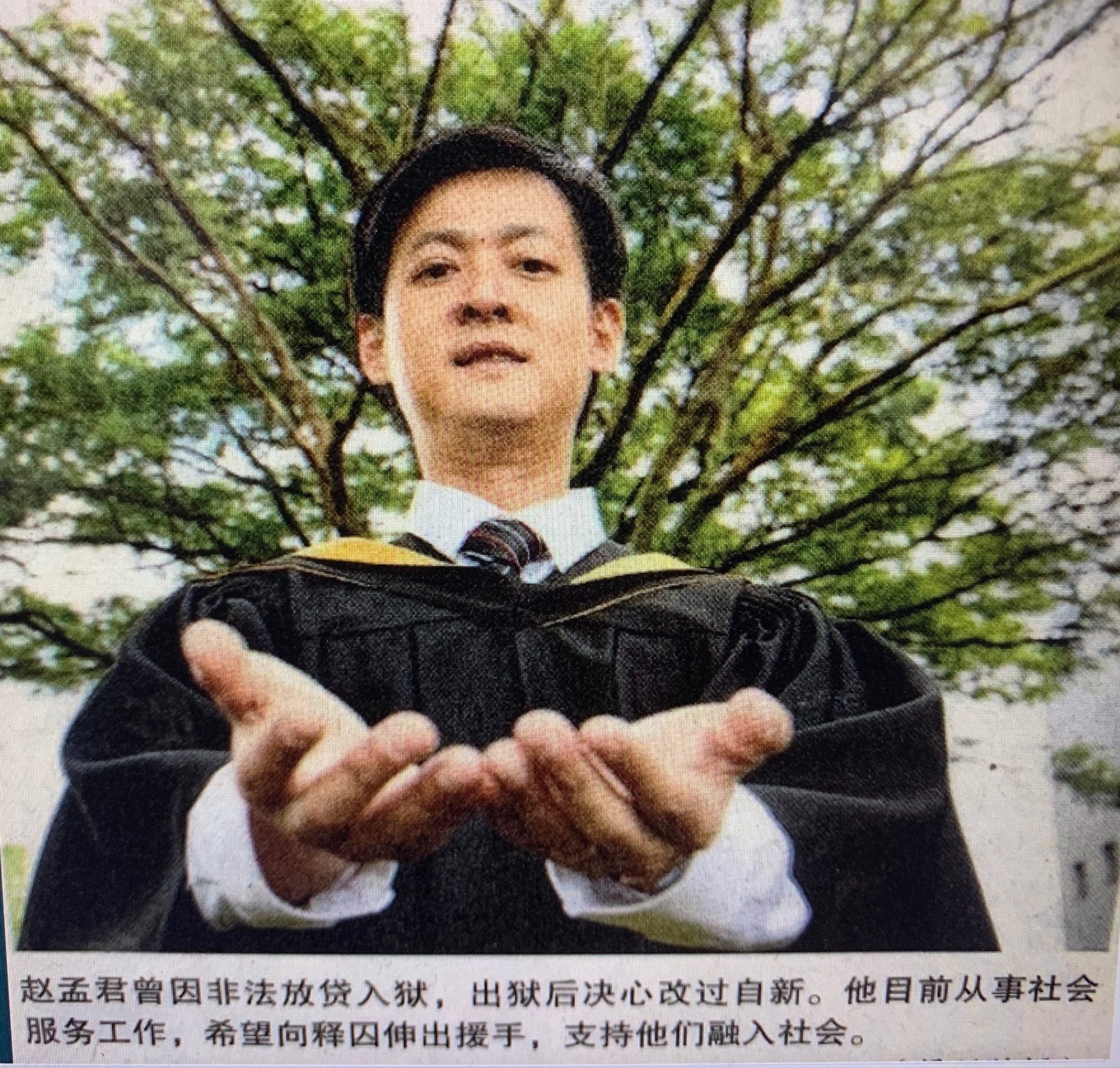
Teo Beng Kim was just eight years old when gang members saw him beating up another student and recognised his “potential”.
They recruited him into their secret society.
“If I were to go back to prison, I want to go back for something big, something worth it.”
Violent and aggressive, he rose through the ranks to become the gang’s headman at 16, with some 80 young gangsters under his charge.
When he was jailed six months for drug possession, he vowed to himself: “If I were to go back to prison, I want to go back for something big, something worth it.”
At age 22, the self-professed “lawless” gangster became the leader of an illegal moneylending syndicate that had operations even in Malaysia. Known to be a hard boss, he was callous and hell-bent on having things done his way.
Law-breaking had been a way of life for Beng Kim from an early age.
The son of hawkers who worked long hours, he grew up in the care of his grandmother in Ang Mo Kio. In the 1980s, it was a popular spot among gangsters, gamblers, drug addicts and alcoholics.

Beng Kim fell into bad company from the time he was in kindergarten.
From kindergarten age, he became acquainted with some of these characters as he roamed around the neighbourhood. He picked up their bad habits as he hung out with them at coffee shops and basketball courts.
He was in lower primary when he first landed up in a police station. He had fought with a classmate’s mother.
In primary school, he was mocked by his schoolmates for having a skin condition that left sores all over his body. He quickly learnt to use violence to stand up for himself.
“Once, I took a chopper and wanted to go and chop (my schoolmate) up. I was having this kind of mindset, that if people make fun of me, I will fight with them,” he said.
He was in lower primary when he first landed up in a police station. He had fought with a classmate’s mother, who had sought Beng Kim out because he had beaten up her son.
“After I first stepped into the police station, I kept going back,” said Beng Kim.
Fights followed more fights. And Beng Kim, age eight, decided that it would be better to join a gang so that he would have back-up.
That was the start of a rash of gang activities through his early teenage years – from indulging in drugs to running gambling dens to fighting for territory.
I was marked absent for all my O’Level subjects … I was that deeply involved in drugs
Fierce and combative, he once stabbed someone from a rival gang with a pocket knife until the man ended up in a coma in the Intensive Care Unit.
Another time, he was accosted by 20 gang members and bludgeoned with metal and wooden poles until he almost blacked out.
“I still could go back to get revenge after that,” Beng Kim said.
“I mean, I enjoyed breaking the law lah. That was one of my habits, every day I have to do.”
His grades began falling in secondary school as he quickly rose up the ranks in his gang.
At age 16 – the year he was to sit for his ‘O’ levels – he was appointed headman of the 80-man secret society.
It gave him even more power to do whatever he pleased.
“What I think is what I did. Even if I think something is not right, I don’t care also.
“I enjoyed breaking the law lah. That was one of my habits, every day I have to do,” said Beng Kim.
With the police on his tail for several rioting cases, teenaged Beng Kim enrolled in halfway house The Hiding Place, in an attempt to escape the law.
He planned to bolt. There was just one problem: The staff member assigned to escort him was the fastest runner in the halfway house.
But enduring cold turkey in confinement was unbearable. So he came up with a plan to escape, never mind that he heard that many who run away would be caught and harshly disciplined.
He planned to bolt when he was allowed to leave the compound for his ‘O’ level oral examination.
There was just one small problem: The staff member assigned to escort him was the fastest runner in the halfway house.
Desperate and with no one else to turn to, he began talking to a cross hanging outside his confinement room. He remembered that the staff had told him about a person called Jesus.
“I called Jesus’ name and I challenged Him, ‘If you are really God, help me in my situation. Show me that You are really God’,” said Beng Kim.
To his surprise, he felt an overwhelming feeling and began weeping uncontrollably. He now recognises it as the presence of God.
In and out of prison five times, it took heartbreak to turn him around
Later, he learnt that another staff member had been reassigned to escort him to school.
“It changed to a plumper guy, cannot really run one lah,” he said, chuckling.
Beng Kim eventually jumped two storeys from his school hall to escape.
“I called Jesus’ name and I challenged Him, ‘If you are really God, help me in my situation. Show me that You are really God’.”
While he admitted that his prayer had been selfish, it planted a seed of faith in him, said Beng Kim.
“After I escaped, I had a very, very strong conviction that Jesus is God,” he said.
He tattooed a cross right below his neck, amid the other gang tattoos that were peppered all over his body. Though he did not consider himself to be a Christian, he began to pray every night to this Jesus.
“Of course, at that point in time, it was very self-centred prayers.”
After flunking his ‘O’ levels twice, Beng Kim got involved in the loanshark industry. He worked under Ah Long San, arguably Singapore’s most notorious loanshark in the 1990s, who once led a multi-million-dollar illegal moneylending syndicate.
After Beng Kim gained enough trust and credibility, Ah Long San entrusted him with $50,000 to start his own loansharking business.

From as young as age eight, Beng Kim was embroiled in multiple violent gang-related activities with his “brothers”. He carried on until he met with an unlikely escape and a far-fetched promise in a prison cell.
With good intentions, Beng Kim began recruiting his “brothers” who had come out of jail and were looking for a job.
His business grew larger and larger. Eventually it turned into a syndicate in its own right, with some 20 men – including managers and runners – under him, some even in Malaysia.
Responsible for more than 200 cases of harassment islandwide, his loansharking ring had a monthly turnover of $500,000. Their database contained about 1,000 debtors’ records.
By his early 20s, Beng Kim was raking in $30,000 to $40,000 a month. After becoming a father and getting married, he purchased a Honda Civic and a four-room flat in Sengkang – all in cash.
He paid little attention to his young family except to give them money.
He spent his days partying, clubbing and racing fast cars.
“It was the highest peak of my life. I saw myself as quite successful. I was carefree, I didn’t have to worry about money.
“Every day I carry a lot of money with me. I just spent as and when I want,” he said.
He saw neither need nor reason to change the way he lived. For even without any educational qualifications, he had forged a lucrative path for himself.
But this would not be for long.
On April 12, 2007, just three days before his 29th birthday, his loansharking ring was busted.
In an islandwide operation, police raided 15 of their premises, seized scores of their tools and documents, and hauled 17 of them into lock-up.
Beng Kim was detained under what is now called the Criminal Law (Temporary Provisions) Act. It allows for the detention of suspects without trial.

The press release by the police reporting on the operation that busted Beng Kim’s loansharking syndicate. Police said the syndicate is believed to have a monthly turnover of about $500,000.
The act is used to deal swiftly with people associated with secret societies and organised criminal groups, such as drug trafficking and loansharking syndicates.
Detainees do not have a fixed date of release. Instead, a committee conducts yearly reviews to see if a suspect is suitable to be discharged.
As he heard his fellow prisoners worshipping with such “fire”, he felt something burning in his heart and moving him to tears.
Knowing that this jail term was far more serious than his last, Beng Kim became more serious about finding out about this Jesus who had once rescued him. He knew he risked facing criticism and ridicule from his “brothers” in prison.
At the first worship service he attended, he heard his fellow prisoners singing and worshipping with such “fire”. He felt something burning in his heart and moving him to tears.
But he fought back the tears, adamant that no one was going to see him cry. Even in prison, he had a reputation for being a hardened criminal.
“People looked up to us (detainees under the Criminal Law Act) because we are in detention, we are involved in gangs. We are not those ‘normal’ criminals.
“In a way they see it as something big lah,” he said.
“So I told myself I don’t want to attend (the worship service) second time, because I don’t want to make myself malu (Malay for ’embarrassed’).”
He had just lost everything. What kind of hope and future was there for him?
He settled for quietly reading a Bible someone had given him in his cell. As he flipped through it, Jeremiah 29:11 grabbed his attention.
“For I know the plans I have for you,” declares the Lord, “plans to prosper you and not to harm you, plans to give you hope and a future.”
He was incredulous. He had just lost everything – his wealth, his business, his freedom. What kind of hope and future was there for him?
Though he could not entirely understand the verse, he continued reading.
“That was when I saw it as a promise from God to me, that He wants to bring me out from this captivity,” he said. (Jeremiah 29:12-14)
Not just physical captivity.
Strangely, in his heart grew a deep hunger to know God.
He understood that there were some “conditions” (Jeremiah 29:13) attached to this promise. He needed to do his part to seek God with all his heart.
Encouraged by some Christian prisoners, he started attending worship services and Bible study sessions again.
He also declined privileges to go outside to work. It would free up time to read the Bible, which he did from day to night daily for three years.
It was a long process of learning God’s values after a whole lifetime of “lawlessness” and doing as he pleased.
Finding his calling: From criminal to President’s Award recipient
Then his second son visited him in prison.
When Beng Kim teased him, the boy responded by calling him “stupid”. It was a mild word compared to the profanities that his older son would have used.
He resolved to stop using vulgarities and to learn how to control his explosive, violent anger.
“My older one learnt a lot of bad habits from me, but my second one, he didn’t really pick up much from me because I went to prison when he was close to one year old.
“That’s when I started to ask myself what kind of father I want to be to my sons when I am released.”
So, one small step at a time, the man who never saw any need to change started tweaking his life.
He made it a point not to break prison rules, no matter how simple. He also resolved to stop using vulgarities and to learn how to control his explosive anger.
“I’m not perfect, I’m just learning lah. I also make mistake. But when I make a mistake, I’ll come out in the worship service and confess, and then make good of it,” he said.
He also signed up to be a part of the prison’s worship team, first by helping to manage the transparency slides on the projector, and subsequently becoming a worship leader.
Seeing a change in Beng Kim, his “brothers” mocked him. They labelled him as “holy” and ostracised him.
It was not easy going from being a respected headman and boss to being looked down upon. But he persisted.
Small steps became bigger steps. And after about two years in prison, he officially renounced his gang affiliations.
Faced with the gallows after killing a man, I found my greatest treasure
It was a difficult choice; being part of a gang had been such a core part of his identity for his whole life.
He knew that his “brothers” who respected him, both in and out of jail, would now look at him with contempt as a betrayer.
He also struggled to give up his portion of profit earned from being a syndicate leader, which he was still entitled to receive despite being in prison. From living the high life, he worried about how he was going to support his family.
“I really struggled a lot whether to give up all these things. But eventually I learnt to submit to God’s calling,” he said.
He had learnt from God’s Word that he cannot serve two masters (Matthew 6:24).
“I just wanted to serve God, that’s why I was willing to give up everything. There was a lot of uncertainty, a lot of worry, a lot of fear, but I guess at the end of the day, it’s what God says that matters.”
“I really struggled a lot whether to give up all these things. But eventually I learnt to submit to God’s calling.”
One of his “brothers” tried to discourage him from going through with the renouncement ceremony. Thanking him for his concern, Beng Kim assured him that he knew what he was doing.
When the ceremony was over, Beng Kim felt different.
“I could feel a rock inside my heart actually falling down, and my whole heart became very light and relieved,” he said.
That was when he recognised that God was working in him, freeing him from captivity.
Beng Kim would spend a total of six years in prison, during which he crafted a new mission statement to “live my new life for God”.
“Compared to my 29 years outside, these six years were the most fulfilling time because I found the purpose of life and I had a very close relationship with Jesus.”
Today, Beng Kim is a programme manager at halfway house HCSA Highpoint.
“I believe God saved me for a reason. He probably wants to use my life to influence some of the brothers who are going through the same things as me,” Beng Kim said.
“I could feel like there was a rock inside my heart actually falling down, and my whole heart became very light.”
While in prison, he realised that many of his fellow inmates have a desire to change, but just do not know how to or where to start.
“They just need someone to show them the way – God’s way, not our own way, because everyone has a different journey,” said Beng Kim, who went on to pursue his Diploma in Social Services. He ended up being the valedictorian of his cohort.
He finds meaning in returning to prison to listen to the inmates’ challenges. He also shares his personal story with them, to empower them with the hope that change is possible.

Beng Kim, a staff member at HCSA Highpoint, finds fulfilment and meaning in journeying with men who are on the path he once was on.
For many of these men, Beng Kim’s transformed life alone is enough of a testimony.
“Sometimes people may not see the way out … until they see that someone like me, last time do this kind of thing, also can change. Then how much more them?”

Chinese newspaper Lian He Zao Bao featured Beng Kim’s journey from prisoner to valedictorian in 2017.
Yet he stresses to them that recovery is not a destination but a journey – one that even he is still on.
Even though he has been clean for eight years now, he still needs to choose daily to live rightly, especially when there are temptations to earn quick money through old friends and illegal means, he said.
It is a costly choice. Beng Kim sees many of his old friends driving sports cars, while he has to take on extra jobs as a private-hire driver and delivery man – on top of his day job – to support his family.
But choosing this path is far more fulfilling, he said.
“Instead of going back to my old ways, to find quick fixes to solve my financial issues, I rather do it with my hard work.
“It’s a way for me to manage my own temptations and use my potential in the right way, not in the wrong way anymore,” he said.
Smoking by 8, wanted in Singapore by 25, he now helps other prisoners
While it will not be an easy journey, Beng Kim believes: “If God can create something out of nothing, which He did in the beginning of creation, then how much more is He able to transform any one of us, even someone like myself who is one of the worst?
“I destroyed a lot of life by harassing people, chasing their debt to the point that even got people commit suicide before. That’s the kind of sin I’ve done.”
Yet, God’s grace and forgiveness reached down to him even when he did not know how much he desperately needed it.
“In the past, I never imagined that one day I would turn over a new leaf, ever come out from a gang. All my life I never had a conviction that I needed to do something different in my life … So honestly I would say that my life is a miracle, and God is using my life to glorify Him.”
This is an excerpt of an article that first appeared in Salt&Light.








